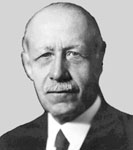About the author…
Charles A. Ellwood (1873-1946) served as the 14th President of the American Sociological Society, now the American Sociological Association. As a Professor of Sociology at the University of Missouri, he studied the conditions of the local county almshouses and jails before moving to Duke University. Throughout his life he was engaged in social reform. Ellwood's textbook Sociology and Modern Social Problems was widely used in colleges and helped establish sociology as a separate field of study. He argued that sociology as an extension of biological science might alter social progress through education and culture. Ellwood was well known internationally as he sought to ground the basis of morality, religion and politics in sociology. His historical approach to sociology was overshadowed by the quantitive scientific approach of contemporary sociological inquiry.
About the work…
In his
Sociology and Modern Social Problems, Ellwood outlines the origin of moral codes and ethics in terms of the competition and conflict inherent in the evolution and development of sociological groups. He maintains that morality is a consequence of survival, and, in light of these studies, the study of morality can now be considered an essential part of sociology. The consequences of this reading would seem to imply that ethics is culturally relative to the specific times and conditions of disparate societies—a sociological view expounded also by Edward Westermarck, William Graham Sumner, and Ruth Benedict. In the short reading selection below, Ellwood explains why "Morality…is not anything arbitrarily designed by the group, but is a standard of conduct which necessities of social survival require."
Explain Ellwood's definition of ethics. Does he implicitly distinguish between morals and ethics?
Describe Ellwood's conception of the relation between ethics and sociology. Does he consider both disciplines to be normative?
According to Ellwood, what are the major factors occasioning war? Why is this so?
Summarize the five major social consequences Ellwood enumerates that arise from conflict among human groups.
How does Ellwood account for the origin of morality within human groups?
What are the reasons Ellwood offers for the view that social progress depends upon competition and cooperation. Explain whether a society can thrive by cooperation alone. Does it follow that Ellwood thinks competition is a necessary condition for moral progress?
To what extent does Ellwood believe human beings can overcome the evolutionary forces of natural selection and survival of the fittest?
